|
 Secure Site
Secure Site
|
 |
Archive for the 'Now & Zen Alarm Clocks' Category
 Getting the Sleep of Your Dreams - Choose a Soothing Alarm Clock We are a sleep-starved nation. Sixty-three percent of American adults do not get eight hours of sleep at night, about 70 million suffer from insomnia, and according to the National Sleep Foundation, nearly seven out of ten report frequent sleeping problems—although most remain undiagnosed. Alarmed? You should be. As Stanford University “sleepdebt” expert William C. Dement, MD, PhD, warns: “Lost sleep accumulates as a debt that must be repaid or health eventually deteriorates.”
This year, the Institute of Medicine released a report linking sleep disorders and sleep deprivation to a host of ills, including an increased risk of hypertension, diabetes, obesity, depression, heart attack, and stroke.
Scientists are confirming what yogis and ayurvedic physicians have reported for centuries: deep sleep rests the body and the mind. Our daily dose of shut-eye regulates our weight, strengthens our immunity, protects our cardiovascular health, repairs our tissues and cells, and restores our energy. Sleep also allows us to process, consolidate, and retain new memories; it balances our emotions, makes us better problem solvers, and feeds our creativity.
But according to yoga, deep, refreshing sleep has an even more important function: it helps us stay spiritually balanced. The ancientrishis (seers) classified sleep as one of the four fountains, or primitive urges (along with food, sex, and self-preservation), that operate at an instinctual level to maintain our survival. When one of these fountains is out of balance, it can imbalance the others, creating obstacles to spiritual growth. For example, when we skimp on sleep, we tend to overeat and imbalance the “food” fountain. Scientific research confirms this: A recent Stanford University study found that the less sleep people got, the heavier they were. Shorter sleep duration boosts our level of ghrelin, a hormone that makes us feel hungry, and suppresses another hormone called leptin, which makes us feel full. And at Case Western Reserve University, researchers who conducted a long-term study with 68,000 women over 16 years found that women who got fewer than five hours of sleep each night were much more likely to gain 33 pounds or more—despite the fact that they ate less than the seven-hour sleepers.
When we fail to get enough sleep, our anxiety level rises, too, disturbing the “self-preservation” fountain. Plus, it’s difficult to maintain a yoga practice when you’re overtired. Who wants to get up early to meditate after tossing and turning all night? Missing our practice can throw our whole day off balance and, worse, feed the cycle of insomnia.
 Wake up with gradual, beautiful acoustic chimes. The Zen Alarm Clock transforms your mornings and gets you started right, with a progressive awakening Instead, wake up refreshed, love your alarm clock, transform your mornings with The Zen Alarm Clock’s progressive awakening with gentle chimes.
Boulder, Colorado—an innovative company has taken one of life’s most unpleasant experiences (being startled awake by your alarm clock early Monday morning), and transformed it into something to actually look forward to. “The Zen Alarm Clock,” uses soothing acoustic chimes that awaken users gently and gradually, making waking up a real pleasure.
Rather than an artificial recorded sound played through a speaker, the Zen Clock features an alloy chime bar similar to a wind chime. When the clock’s alarm is triggered, its chime produces a long-resonating, beautiful acoustic tone reminiscent of a temple gong. Then, as the ring tone gradually fades away, the clock remains silent until it automatically strikes again three minutes later. The frequency of the chime strikes gradually increase over ten-minutes, eventually striking every five seconds, so they are guaranteed to wake up even the heaviest sleeper.
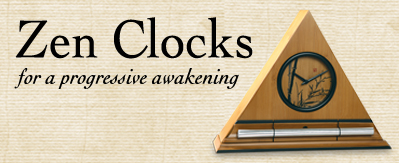 Soothing Chime Alarm Clocks with Natural Acoustic Sounds Now & Zen – The Soothing Chime Alarm Clock Store
1638 Pearl Street
Boulder, CO 80302
(800) 779-6383
Posted in Bamboo Chime Clocks, Now & Zen Alarm Clocks, Progressive Awakening, sleep, Sleep Habits
 Re-wire Your Brain for Happiness - Choose a Meditation Timer with Chime A quiet explosion of new research indicating that meditation can physically change the brain in astonishing ways has started to push into mainstream.
Several studies suggest that these changes through meditation can make you happier, less stressed — even nicer to other people. It can help you control your eating habits and even reduce chronic pain, all the while without taking prescription medication.
Meditation is an intimate and intense exercise that can be done solo or in a group, and one study showed that 20 million Americans say they practice meditation. It has been used to help treat addictions, to clear psoriasis and even to treat men with impotence.
The U.S. Marines are testing meditation to see if it makes more focused, effective warriors. Corporate executives at Google, General Mills, Target and Aetna Insurance, as well as students in some of the nation’s classrooms have used meditation.
Various celebrities also are known meditators, including shock jock Howard Stern, actors Richard Gere, Goldie Hawn and Heather Graham, and Rivers Cuomo, the lead singer of the band Weezer.
In one study, a research team from Massachusetts General Hospital looked at the brain scans of 16 people before and after they participated in an eight-week course in mindfulness meditation. The study, published in the January issue of Psychiatry Research: Neuroimaging, concluded that after completing the course, parts of the participants’ brains associated with compassion and self-awareness grew, and parts associated with stress shrank.
Recently, the Dalai Lama granted permission for his monks, who are master mediators, to have their brains studied at the University of Wisconsin, one of the most high-tech brain labs in the world.
Richie Davidson, a PhD at the university, and his colleagues, led the study and said they were amazed by what they found in the monks’ brain activity read-outs. During meditation, electroencephalogram patterns increased and remains higher than the initial baseline taken from a non-meditative state.
But you don’t have to be a monk to benefit from meditation, which is now gaining acceptance in the field of medicine.
 The Most Soothing Meditation Timer and Clock with Chime Physicians have increasingly started prescribing meditation instead of pills to benefit their patients. A Harvard Medical School report released in May found that more than 6 million Americans had been recommended meditation and other mind-body therapies by conventional health care providers.
Perhaps the most mind-bending potential benefit of meditation is that it will actually make practitioners nicer. Chuck Raison, a professor at Emory University, conducted a meditation study in which he hooked up microphones to participants who had been taught basic meditation and those who hadn’t. He then recorded them at random over a period of time. Raison found that these newly-trained mediators used less harsh language than people who had no meditation experience.
“They were more empathic with people,” Raison said. “They were spending more time with other people. They laugh more, you know, all those things. They didn’t use the word ‘I’ as much. They use the word ‘we’ more.”
However, even the Dalai Lama admitted that meditation is not the silver bullet cure-all for every ailment or emotion.
“Occasionally, [I] lose my temper,” he said. “If someone is never lose temper then perhaps that may come from outer space, real strange.”
The Dalai Lama also cautioned that meditation takes patience, so new mediators should not expect immediate results.
“The enlightenment not depend on rank,” he said, laughing. “It depends on practice.”
Some scientists believe that in a generation, Americans will see meditation as being as essential to maintaining a healthy lifestyle as diet and exercise.
Although meditation can be done in almost any context, practitioners usually employ a quiet, tranquil space, a meditation cushion or bench, and some kind of timing device to time the meditation session. Ideally, the more these accoutrements can be integrated the better. Thus, it is conducive to a satisfying meditation practice to have a timer or clock that is tranquil and beautiful. Using a kitchen timer or beeper watch is less than ideal.
And it was with these considerations in mind that we designed our digital Zen Alarm Clock and practice timer. This unique “Zen Clock” features a long-resonating acoustic chime that brings the meditation session to a gradual close, preserving the environment of stillness while also acting as an effective time signal.
adapted from worldnewsreport.com by Maggy Patrick and Lauren Effron
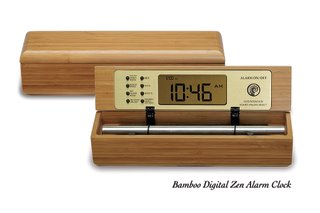 The Most Soothing Meditation Timer and Clock with Acoustic Chime Now & Zen – The Meditation Timer Store
1638 Pearl Street
Boulder, CO 80302
(800) 779-6383
Posted in Meditation Timers, Meditation Tools, Now & Zen Alarm Clocks, Zen Alarm Clock, Zen Timepiece by Now & Zen, Zen Timers
 Meditation - Even a Little Helps - Ukiyoe - Genji Monogatari Musee Saint Remi You don’t have to be a monk.
Scientific literature is brimming with research showing that transcendental meditation literally changes the structure of the human brain, at least among persons who practice “mindfulness,” as it is sometimes called, for many years.
But new research shows that even 20 minutes a day, four days a week, can produce an impressive increase in critical cognitive skills.
“Simply stated, the profound improvements that we found after just four days of meditation training are really surprising,” psychologist Fadel Zeidan said in releasing the study. “It goes to show that the mind is, in fact, easily changeable and highly influenced, especially by meditation.”
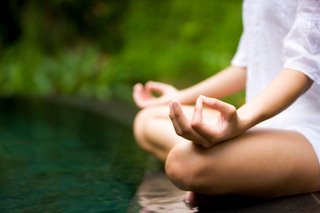 Meditation - Choose a Gong Meditation Timer for Your Practice Zeiden led the study while finishing his doctoral studies at the University of North Carolina, Charlotte. He is now a researcher at Wake Forest University School of Medicine.
Benefits Unlikely to Last Long Unless You Keep at It
If other scientists replicate his work, it means it may not be necessary to lock yourself in a closet for hours at a time to benefit from this Far Eastern therapy.
That said, however, this research does not suggest that more would not be better, and Zeidan cautioned that while a modest effort can produce big results, they are not likely to last long unless you keep it up over an extensive period of time. Like years.
And while there are many books out there explaining “do-it-yourself” techniques, the participants in the North Carolina study were trained professionally, although for a total of only 80 minutes. Those who received the training were as much as 10 times better in their ability to remain focused on a subject while retaining other information.
All 63 participants were students, and only 49 completed the experiment, suggesting this may not be as easy as it sounds. The students were divided into two groups, and all were subjected to a broad range of behavioral tests on mood, memory, visual attention, and vigilance. Then one group listened to a reading of J.R.R. Tolkein’s “The Hobbit.”
Meditation Training Was Basic Buddhist Meditation
The other group received the meditation training for an equivalent period of time.
The two groups were equal on the behavioral tests at the beginning of the experiment. Both scored about the same on mood testing in the second phase, but the students who received the meditation training scored significantly higher on cognitive tests.
In one test, students were shown an image, called a stimulus, on a computer monitor and told to identify it every time the stimulus appeared. If they got it right, the images would speed up, making it more difficult.
The students who received the meditation training averaged about 10 consecutive correct answers while the group that listened to the reading averaged only about one.
The training itself was pretty basic Buddhist meditation. Participants were told to relax, keep their eyes closed, and focus on the flow of their breath at the tip of their nose. If their thoughts strayed, they were instructed to note the thoughts, and resume concentrating on their breath.
Sounds preposterous, right? Why would something that simple change the brain?
Meditation Changes Structure of the Brain, Research Shows
 Meditation - Use a Gong Meditation Timer for Your Practice Numerous studies by very serious scientists show at least partly why it works, at least over the long haul.
— Buddhist Insight meditation, practiced 40 minutes a day, literally changed the structure of the brain, according to a study by researchers from Yale, Harvard, Massachusetts General Hospital and the Massachusetts Institute of Technology. That 2005 study was based on functional magnetic resonance imaging that showed an increase in thickness of regions of the brain that are important for sensory, cognitive and emotional processing. The changes are expected to be “long lasting,” the researchers said.
— Brain imaging at the University of Wisconsin-Madison in 2008 showed that brain circuits used to detect emotions and feelings were “dramatically changed” in subjects who had extensive experience practicing compassion meditation. That suggests we can train ourselves to be compassionate, much like we train to play a musical instrument. The participants in this study, by the way, were Tibetan monks with at least 10,000 hours of meditation.
— Can it reduce pain? Yes, according to research in London involving 12 monks with 30 years experience. Brain scans showed the monks had a 40 to 50 percent lower brain response to pain than 12 persons who had no training in transcendental meditation. But here’s the surprising finding. When the 12 untrained persons were trained for five months, they also lowered their pain response by a comparable 40-50 percent.
Continued Practice Needed for Long-Term Stable Changes
Numerous other studies have shown real physical changes ranging from enhanced immunity to a slowing of the aging-related atrophy of some areas of the brain.
So this is big stuff, but in a telephone interview Zeidan offered a few words of caution.
“By no means will four days of practice be it. This just suggests that the effect of meditation can be directly perceived and there are some short term benefits,” he said.
“We were really surprised with the findings. There are some dramatic differences in cognition, but it’s kind of like going to the gym and working on a bicep. You go to the gym four days and you might be sore, there might be some muscle strength increase, but that’s it. If you stop, your muscle is going to go back.
“So you have to continue to practice to experience more long term stable changes,” he added. But you don’t have to become a monk.
adapted from worldnewsreport.com by Lee Dye
As beautiful to see as it is to hear, the Zen Timepiece is also a decorative accessory that adds elegance to any room. Its wood platform (available in cherry or maple) is designed to be positioned either with the clock’s digital display to the front, or turned around, with the bowl-gong in the front. Although the clock looks good both ways, when the digital display is turned to the back it accentuates the clock’s natural theme and helps reduce the visual clutter of electronic modernity in one’s interior environment.
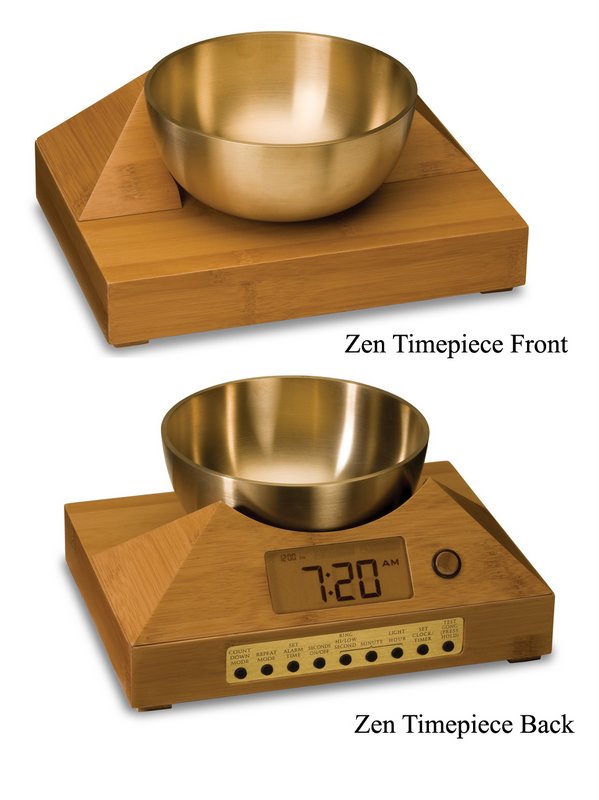 Gong Meditation Timer for Your Stillness Practice
At a suggested retail price of $199.95, it may be the world’s most expensive alarm clock, but according to Steve McIntosh, it’s definitely worth it: “Waking up in the morning is a metaphor for life, and anything that adds grace and beauty to this daily process is a good investment. When you use the Zen Timepiece it’s like waking up in a Zen temple.”
 Visit our Gong Meditation Store - Boulder, CO Now & Zen – The Gong Meditation Store
1638 Pearl Street
Boulder, CO 80302
(800)779-6383
Posted in Meditation Timers, Meditation Tools, mindfulness practice, Now & Zen Alarm Clocks, Zen Timepiece by Now & Zen, Zen Timers
 How to Get That Extra Hour of Sleep: UTAMARO, Kitagawa, A Mother Dozing While Her Child Topples a Fish Bowl Amid the hustle of every day stress, there are some simple steps people can take to get a better night’s sleep.
“You need to set aside the time for sleep. You need a few hours to unwind before. It takes time for the brain to wind down,” said Dr. Charles Czeisler, professor of sleep medicine at Harvard Medical School.
At Northside Hospital Sleep Disorders Center Roberts was taught “sleep hygiene,” — a healthy routine that should be practiced before bed.
Stimulants — soda, chocolate, any kind of caffeine — should be avoided at least four hours before bed, she said. She also said that you should not exercise three to four hours prior to sleep. Eating a light meal and eliminating alcohol consumption also helps. And lights should be dimmed and the TV turned off to help prepare the mind to relax into a slumber.
And calling it an earlier night may show some benefits. In a 2009 study published in the New England Journal of Medicine, heart attacks in Sweden rose by 5 percent in that first week of spring, when many people were adjusting to losing an hour of sleep. In the fall when the clocks are reset, heart attacks dropped, according to the study.
 Alternative Alarm Clock - for a Soothing, Progressive Awakening Boulder, Colorado—an innovative company has taken one of life’s most unpleasant experiences (being startled awake by your alarm clock early Monday morning), and transformed it into something to actually look forward to. “The Zen Alarm Clock,” uses soothing acoustic chimes that awaken users gently and gradually, making waking up a real pleasure.
Rather than an artificial recorded sound played through a speaker, the Zen Clock features an alloy chime bar similar to a wind chime. When the clock’s alarm is triggered, its chime produces a long-resonating, beautiful acoustic tone reminiscent of a temple gong. Then, as the ring tone gradually fades away, the clock remains silent until it automatically strikes again three minutes later. The frequency of the chime strikes gradually increase over ten-minutes, eventually striking every five seconds, so they are guaranteed to wake up even the heaviest sleeper. This gentle, ten-minute “progressive awakening” leaves users feeling less groggy, and even helps with dream recall.
adatped from abcnews.com by LARA SALAHI
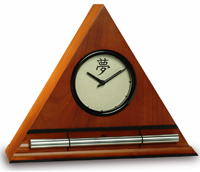 Alternative Alarm Clock - The Zen Clock with Chime Now & Zen – The Alternative Alarm Clock Store
Real Acoustic Alarm Clocks with Chimes and Gongs
1638 Pearl Street
Boulder, CO 80302
(800) 779-6383
Posted in Bamboo Chime Clocks, Natural Awakening, Now & Zen Alarm Clocks, sleep, Sleep Habits
 The Zen Timepiece can serve as a mindfulness bell Little by little, meditation is shedding its image as a strange spiritual discipline practiced by monks and ascetics in Asia. Gwyneth Paltrow meditates. Rivers Cuomo, lead singer of the rock band Weezer, meditates. David Lynch — his movies are strange, but he is strangely normal — meditates. Meditation has helped recent military veterans deal with post-traumatic stress disorder.
Beyond celebrities and the military, there’s science. A growing body of research shows that meditation has a discernible effect on the brain that promotes various types of health and well-being.
Anyone interested may need to surmount the final hurdle: the assumption that meditation is hard, time-consuming, painful or complicated. Or religious. While there are lots of different kinds of meditation — from transcendental meditation to Zen — experts and health organizations such as the National Institutes of Health agree a beginner need not bother grappling with them. Meditation is simple and easy, and everyone can do it and benefit from it. Here are some tips:
Find some free time — at least 20 minutes — and as calm and quiet a place as you can. Meditating with interruptions from your BlackBerry or your computer doesn’t really work.
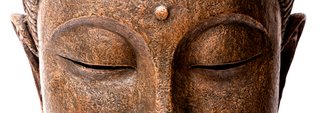 Buddha Sit down and make yourself comfortable. Some traditions use physical positions — mudras, in Sanskrit — in meditation. The most famous is sitting on the ground in the lotus position, i.e., Indian style. If you are comfortable sitting this way for longer than a few minutes, fine. If not, sit in a chair.
Don’t just do something, sit there — to quote the title of a well-known book on meditation by Sylvia Boorstein. Don’t launch immediately into what you think meditation is. Let your mind and body settle for a minute or so. Life is stressful enough; don’t make meditation stressful and rushed.
Pick something and gently center your attention on it. It can be your breathing, which works well because of its easy, natural rhythm. It can be an image, mental or physical — one can meditate with eyes open or closed, whichever works. It can be a mantra, a sound or word that you repeat in your mind or with your voice. “Om” — with most of your time resting on that nice m sound — is the most famous.
When your mind wanders, gently bring it back to the thing you picked.
When your mind wanders again, gently bring it back to the thing you picked. The mind is a wandering machine. Meditation is not having an empty mind; it’s gently quieting your mind using the technique of concentrating on one thing. Over the time you sit, you will likely notice your mind getting a bit quieter.
When your mind wanders again, gently bring it back to the thing you picked. The key word is gently. Meditation is a simple technique, but it’s also an approach, a way of being. People, especially Americans, tend to worry about doing it right. Worrying about doing it right is the one wrong way to meditate. Don’t be angry or frustrated with your mind or yourself.
Gently close your meditation when you wish or need to. The idea is relaxation and reducing stress, remember? Make it smooth, not jarring. Let the relaxation you cultivated breathe a bit before going on to the next thing in your day.
Repeat as needed. Meditation works best when it’s done regularly and over a long period. That doesn’t have to mean for hours every day. It can be once every other day for 20 minutes. Many meditaters refer to their “practice.” Its benefits happen, and happen more deeply, when it’s something you do regularly for some time.
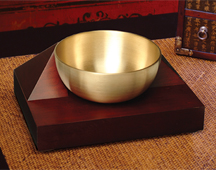 The Zen Timepiece - a Singing Bowl Meditation Timer and Clock Use our unique “Zen Clock” which functions as a Yoga & Meditation Timer. It features a long-resonating acoustic chime that brings your meditation or yoga session to a gradual close, preserving the environment of stillness while also acting as an effective time signal. Our Yoga Timer & Clock can be programmed to chime at the end of the meditation or yoga session or periodically throughout the session as a kind of sonic yantra. The beauty and functionality of the Zen Clock/Timer makes it a meditation tool that can actually help you “make time” for meditation in your life. Bring yourself back to balance.
adapted from worldnews.com by Edward Lovett
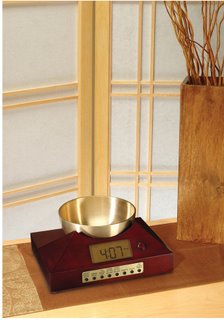 Singing Bowl Meditation Timer called The Zen Timepiece Now & Zen – The Singing Bowl Meditation Timer Store
1638 Pearl Street
Boulder, CO 80302
(800) 779-6383
Posted in Bamboo Chime Clocks, Meditation Timers, Meditation Tools, mindfulness practice, Now & Zen Alarm Clocks
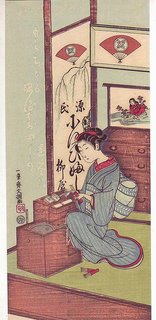 Soothing Sounds Timer and Alarm Clock with Gentle Acoustic Chime Breathing Exercise to Calm Down:
Of course, breathwork alone won’t magically resolve your issues. But it can bring you into greater awareness of your emotions before they sabotage your mood or behavior. And that alone may be worth it.
Calm Down: Slow Breath (three minutes)
What You’ll Need
A Zen Chime Timer; a folded blanket or firm cushion.
What It Does
This practice calms the mind and the central nervous system, helping put the brakes on a frenzied pace. “When you slow your breathing down, you slow your life down,” says Strom. Plus, it can spark your creativity. “I’ve had students stop in the middle of class and grab a pen. When the mind chatter stops, the ideas fly in.”
How To Do It
Set your Zen Timer & Clock for three minutes so you don’t have to keep track. Be sure to keep your spine erect. (Slouching can inhibit deep breathing.)
-Begin to lengthen the inhalation and exhalation (breathing slowly through your nose). First try inhaling for a count of four and exhaling for a count of four, then lengthen (aim for a count of seven on the in breath and seven on the out breath).
-Be careful not to hold your breath. You want to slow it down, not stop it.
-When the timer goes off, return to a normal breathing pace.
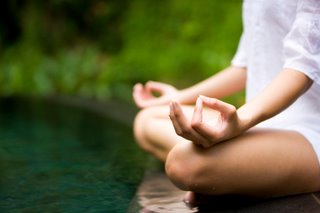 Soothing Sounds Time with Gentle Chime 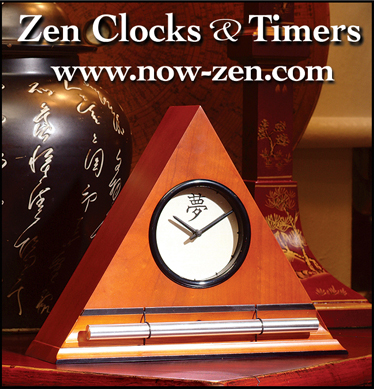 Soothing Sounds Timer & Alarm Clock by Now & Zen Now & Zen – The Soothing Sounds Alarm Clock Store
1638 Pearl Street
Boulder, CO 80302
(800) 779-6383
Posted in Chime Alarm Clocks, Meditation Timers, Meditation Tools, mindfulness practice, Now & Zen Alarm Clocks
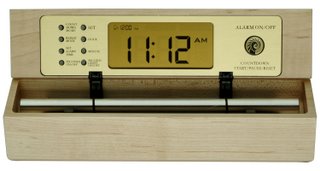 chime on the hour clock with real acoustic chimes In addition to functioning as a chiming alarm clock and countdown timer, the Digital Zen Alarm Clock can be set to chime repeatedly at any set interval, and to chime once on the hour every hour. The chime’s “B tone” has been hand-tuned using the ancient Pythagorean method-the clock’s tone is the same as that produced by tuning forks used by musical therapists. And not only does the Digital Zen Alarm Clock sound beautiful, it looks beautiful as well. Its solid hardwood case is an attractive addition to an altar or mantel. Our company, Now & Zen, began in 1996 with the introduction of our now world famous Zen Alarm Clock (the original table-top model). Although we have developed many new products since then, nothing we have produced has generated the excitement and anticipation of the Digital Zen Alarm Clock.
 sleeping woman, wake up to soothing chime alarm clocks Now & Zen
1638 Pearl Street
Boulder, CO 80302
(800) 779-6383
Posted in Bamboo Chime Clocks, Now & Zen Alarm Clocks, Progressive Awakening, Pythagoras, sleep
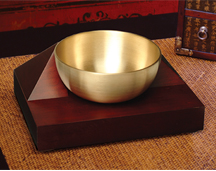 gong meditation timers and alarm clocks  The Most Unique Gong Meditation Timer with Tibetan Singing Bowl As beautiful to see as it is to hear, the Zen Timepiece is also a decorative accessory that adds elegance to any room. Its wood platform (available in cherry or maple) is designed to be positioned either with the clock’s digital display to the front, or turned around, with the bowl-gong in the front. Although the clock looks good both ways, when the digital display is turned to the back it accentuates the clock’s natural theme and helps reduce the visual clutter of electronic modernity in one’s interior environment. At a suggested retail price of $199.95, it may be the world’s most expensive alarm clock, but according to Steve McIntosh, it’s definitely worth it: “Waking up in the morning is a metaphor for life, and anything that adds grace and beauty to this daily process is a good investment. When you use the Zen Timepiece it’s like waking up in a Zen temple.”
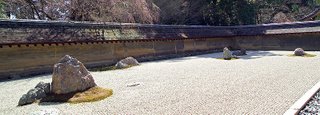 zen clocks and chimes Now & Zen – The Gong Meditation Timer Store
1638 Pearl St.
Boulder, CO 80302
(800) 779-6383
Posted in Bamboo Chime Clocks, Now & Zen Alarm Clocks, Zen Alarm Clock, Zen Timepiece by Now & Zen, Zen Timers
 Kiyonaga Torii, Bonsai Vendor - Soothing Sound Alarm Clock & Timer from Now & Zen, Inc. With your heart open and your breath flowing, make a choice to fully regain your sense of well-being and empowerment. Expand your attention to include full-body awareness by saying to yourself: “I’m aware of my whole body at once, here in this present moment.”
On any given day, you likely feel spontaneous moments of peace that arise when you’re watching children play, for instance, or exercising or witnessing a beautiful sunset. This step of the sequence helps you consciously initiate this relaxing feeling so you feel whole and in the moment by choice rather than by chance. After all, the things you focus on help create your mood — and what you focus on is up to you. By waking up to the present moment, you regain your sense of well-being and control. As Selby explains, “You can shift from being the victim of your mood swings to being the victor.”
 Meditation for an Uplifted Mood Meditation 101:
Do I really need a timer?
Time is such a drag, especially when you have entered that timeless state of bliss that sometimes arises when you meditate or practice yoga. Ideally, once you achieve samadhi through such practices, you can just go on and on with no concern for such petty worldly concerns such as what time it is. However, unless you’re a monk or nun, endless bliss can have a way of interfering with your life’s other commitments.
This is why using a timer as an accoutrement to your spiritual practice can be both handy for you and a way of being considerate to others.
Yet because time and timing can sometimes be a drag, it is important to make the best of it. And the best way to make time your ally is by using a clock/timer that is beautiful to both eye and ear. This is the role of the Zen Alarm Clock; it’s a practice timer and alarm clock housed in a beautiful hardwood case and featuring the long resonating and tranquil sounds of an acoustic chime or brass bowl-gong. Used as a timer, the Zen Clock brings a graceful end to your practice session. And as an alarm clock it makes waking up an exquisite experience you will actually look forward to! To see and hear our entire line of Zen Clocks and timers, visit us at: www.now-zen.com, or stop by our headquarters store in downtown Boulder Colorado on Pearl Street. Namaste.
adapted from Body + Soul, Jan/Feb 2007 by Terri Trespicio
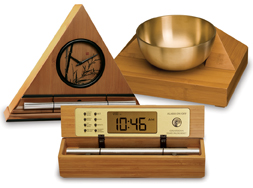 Soothing Sound Alarm Clock & Timers by Now & Zen, Inc. Now & Zen
The Soothing Alarm Clock Headquarter Store
1638 Pearl Street
Boulder, CO 80302
(800) 779-6383
Posted in Bamboo Chime Clocks, Meditation Timers, Meditation Tools, mindfulness practice, Now & Zen Alarm Clocks, Well-being, Yoga Timer, Zen Timepiece by Now & Zen, Zen Timers
 The Perfect Sleep Routine Tip: The Perfect Sleep Routine
Morning
Wake up to your Zen Alarm Clock at the same time every day, whether that’s 5:30 or 8:30. This ritual will help maintain your circadian rhythms and make it more likely you’ll fall asleep at the same time every night, too. (Yes, you can sleep an hour later on weekends.) As soon as you wake up, “get into some sort of daylight situation really quickly, even if it’s just stepping out on a balcony,” suggests sleep expert Joyce Walsleben, R.N., Ph.D. Bright light suppresses the production of melatonin, a sleep-inducing hormone in your brain, and helps set your body clock. If you’re going to have coffee, this is the time. Walsleben recommends that women avoid it from noon on, and limit their morning dose to a cup or two. And keep in mind that “if you drink an 8-ounce cup in the morning,” cautions Rubin Naiman, Ph.D., “you may still have small amounts of caffeine left in your blood at bedtime.”
Afternoon
At lunchtime, choose wisely: An animal study published in the journal Cell Metabolism in November 2007 linked a high-fat diet with a disrupted circadian clock. At least three hours before bed, get some exercise that raises your heart rate. “Aerobic exercise in the late afternoon — even just walking home from work — can help you burn off the stress of the day and raise your body temperature,” Walsleben explains. “This has the potential to deepen your sleep later on.” Also, avoid taking siestas during the day to help maintain your sleep drive.
Evening
Eat dinner several hours before bed to give your body time to digest, and avoid spicy or heavy foods if you’re prone to heartburn. If you drink wine or beer, do so “three or four hours away from bedtime,” advises Walsleben; while alcohol may speed the onset of sleep, it can disrupt the sleep cycle later.
Night
Avoid watching intense TV shows, paying bills, or engaging in other stimulating activities an hour or two before bedtime. Instead, dim the lights to stimulate the release of melatonin and do a few relaxing yoga poses (such as Legs Up the Wall and Child’s Pose) or 10 minutes of deep breathing or meditation. If you have a bathtub, use it. (Adding relaxing lavender oil will help.)
adapted from Body + Soul Magazine, May 2008 by Sarah Schmelling
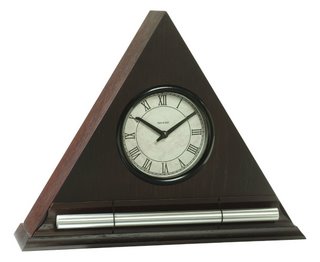 Dark Oak Zen Alarm Clock with Chime, the original progression clock Now & Zen’s Alarm Clock Shop
1638 Pearl Street
Boulder, CO 80302
(800) 779-6383
Posted in Bamboo Chime Clocks, Japanese Inspired Zen Clocks, Natural Awakening, Now & Zen Alarm Clocks, Progressive Awakening, sleep, Sleep Habits, Well-being
« Previous Page — « Previous Entries
Next Entries » — Next Page »
|
|
|
|